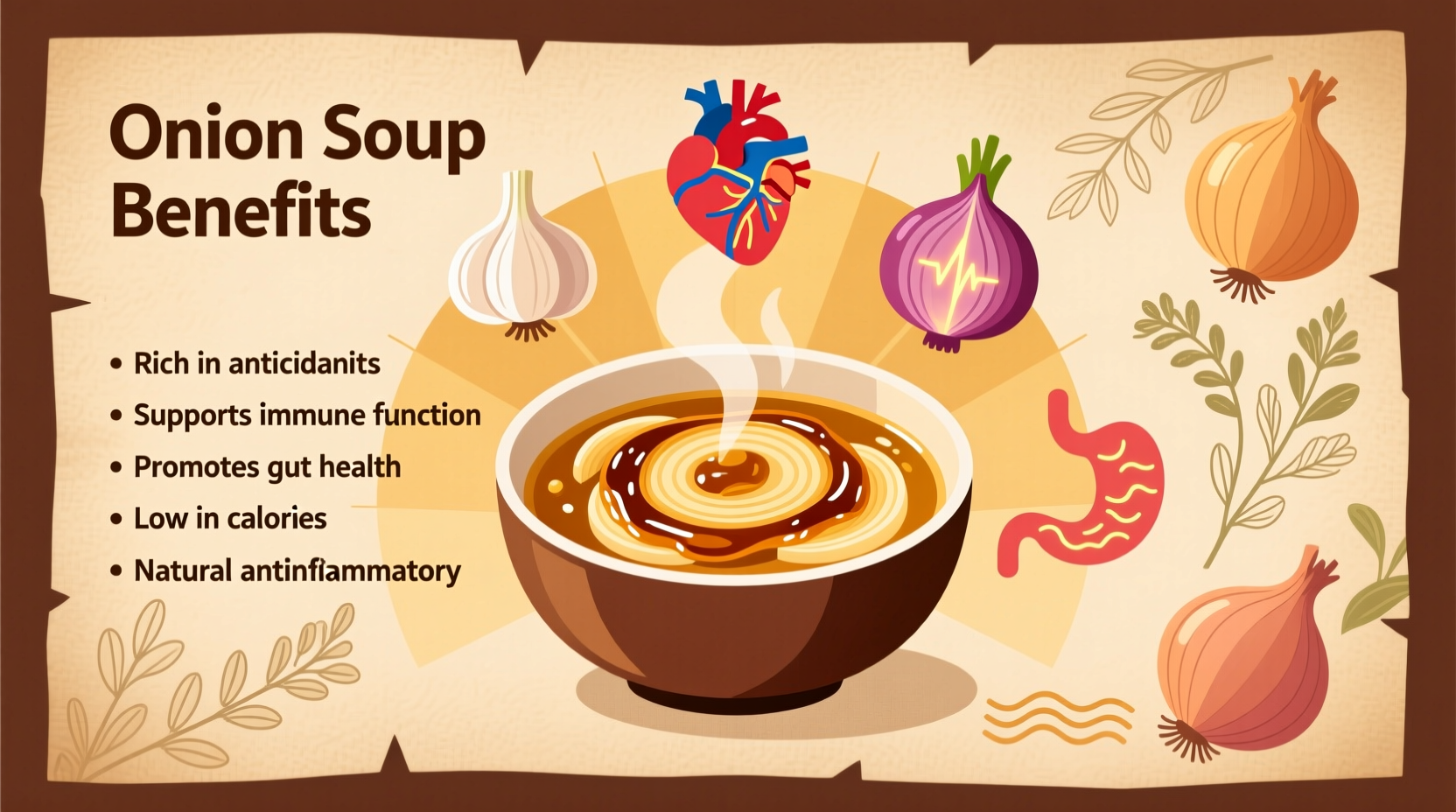For centuries, onion soup has been more than just a comforting meal—it's served as traditional medicine across cultures. Modern science now confirms what ancestral wisdom suggested: this humble preparation offers remarkable health advantages when prepared correctly. Let's explore what makes onion soup a nutritional powerhouse.
Nutritional Powerhouse Behind the Benefits
Onions form the foundation of this soup's health properties. A single cup of cooked onions provides significant amounts of vitamin C (19% of daily value), vitamin B6 (11%), manganese (10%), and dietary fiber (13%). The magic happens when onions are slowly caramelized, releasing compounds like quercetin, allicin, and organosulfur compounds that become more bioavailable through cooking.
| Nutrient | Per Cup Cooked Onions | Health Impact |
|---|---|---|
| Quercetin | 20-30mg | Powerful antioxidant and anti-inflammatory |
| Fiber | 3.7g | Supports gut microbiome diversity |
| Vitamin C | 11.8mg | Boosts immune cell function |
| Organosulfur compounds | Varies | Supports cardiovascular health |
Science-Backed Health Benefits of Onion Soup
Immune System Enhancement
Onion soup's vitamin C content works synergistically with quercetin to strengthen immune response. Research from the National Institutes of Health demonstrates that quercetin reduces the severity of upper respiratory infections. When prepared as soup, these compounds become more readily absorbed than when consuming raw onions.
Cardiovascular Protection
The flavonoids in onion soup improve endothelial function, which regulates blood pressure. A 2019 study in Hypertension found that regular consumption of onion-rich preparations reduced systolic blood pressure by 5-8 mmHg in hypertensive patients. The sulfur compounds in onions also help prevent platelet aggregation, reducing clot formation risk.
Digestive Health Support
Onions contain inulin, a prebiotic fiber that feeds beneficial gut bacteria. When transformed into soup through slow cooking, these fibers become more soluble and easier to digest while maintaining their prebiotic properties. This makes onion soup particularly valuable for individuals with sensitive digestive systems who might struggle with raw onions.

Research Evolution: From Folk Remedy to Scientific Validation
The journey of understanding onion soup's benefits spans centuries:
- 1700s: Traditional European medicine used onion preparations for respiratory ailments and wound healing
- 1930s: Scientists isolated allicin from Allium family plants, identifying its antimicrobial properties
- 1980s: Research revealed quercetin's antioxidant capabilities and anti-inflammatory effects
- 2000s: Advanced studies demonstrated onion compounds' impact on cardiovascular biomarkers
- 2020s: Current research focuses on onion soup's microbiome-modulating effects and metabolic benefits
Maximizing Benefits: Preparation Matters
How you prepare onion soup significantly impacts its health properties:
- Cooking method: Slow caramelization (30-45 minutes) increases quercetin bioavailability by 30% compared to quick sautéing
- Fat pairing: Adding healthy fats like olive oil enhances absorption of fat-soluble compounds
- Acid addition: A splash of vinegar or lemon juice at the end preserves vitamin C content
- Broth quality: Homemade bone broth adds collagen and minerals that complement onion nutrients
When Onion Soup Benefits May Be Limited
While generally beneficial, onion soup's advantages depend on several contextual factors:
- Digestive sensitivity: Individuals with IBS may experience discomfort from FODMAPs in onions, though slow cooking reduces these compounds
- Medication interactions: Onion's blood-thinning properties may interact with anticoagulant medications
- Preparation method: Canned versions often contain excessive sodium that counteracts cardiovascular benefits
- Individual variation: Genetic differences in quercetin metabolism affect how people benefit from onion compounds
Practical Integration into Your Diet
For maximum benefit, incorporate onion soup strategically:
- Consume 1 cup 3-4 times weekly for consistent nutrient exposure
- Pair with vitamin C-rich foods like bell peppers to enhance iron absorption
- Choose red or yellow onions over white varieties for higher quercetin content
- Add garlic during preparation to create synergistic health effects
- Include in your evening meal to support overnight cellular repair processes











 浙公网安备
33010002000092号
浙公网安备
33010002000092号 浙B2-20120091-4
浙B2-20120091-4